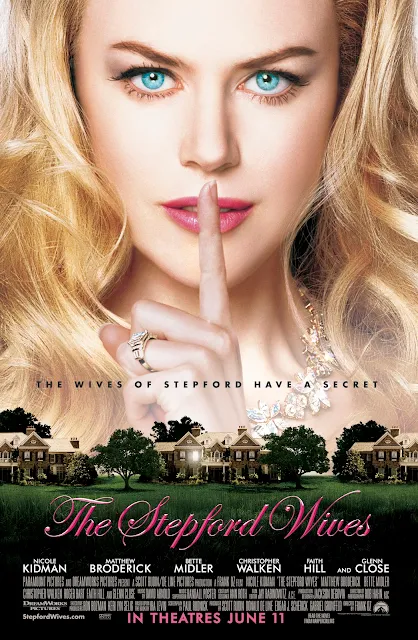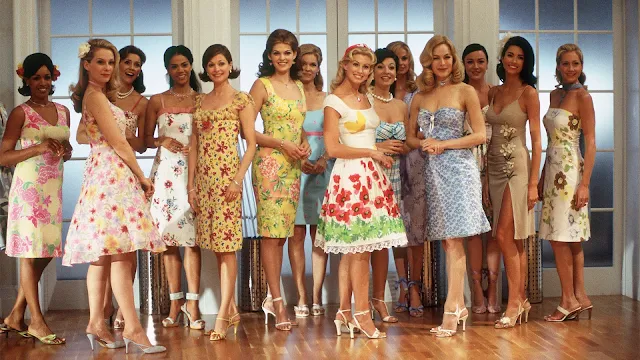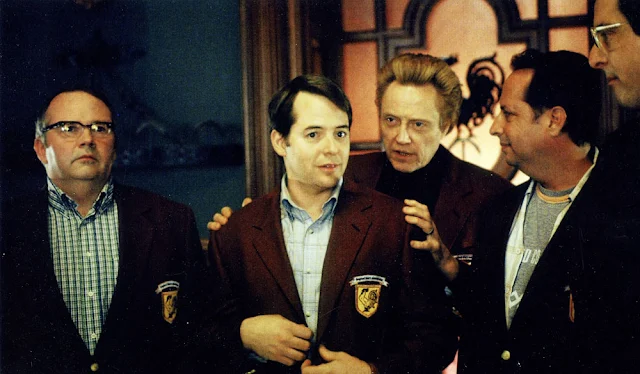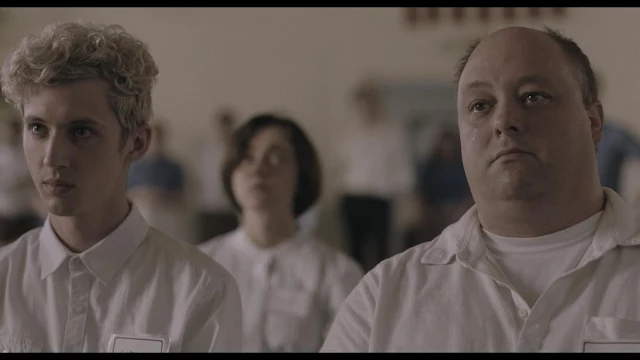A blog formerly known as Bookishness / By Charles Matthews
"Dazzled by so many and such marvelous inventions, the people of Macondo ... became indignant over the living images that the prosperous merchant Bruno Crespi projected in the theater with the lion-head ticket windows, for a character who had died and was buried in one film and for whose misfortune tears had been shed would reappear alive and transformed into an Arab in the next one. The audience, who had paid two cents apiece to share the difficulties of the actors, would not tolerate that outlandish fraud and they broke up the seats. The mayor, at the urging of Bruno Crespi, explained in a proclamation that the cinema was a machine of illusions that did not merit the emotional outbursts of the audience. With that discouraging explanation many ... decided not to return to the movies, considering that they already had too many troubles of their own to weep over the acted-out misfortunes of imaginary beings."--Gabriel García Márquez, One Hundred Years of Solitude
Search This Blog
Showing posts with label Nicole Kidman. Show all posts
Showing posts with label Nicole Kidman. Show all posts
Monday, January 20, 2025
Margot at the Wedding (Noah Baumbach, 2007)
Cast: Nicole Kidman, Jennifer Jason Leigh, Jack Black, Zane Pais, Ciarán Hinds, Halley Feiffer, John Turturro. Screenplay: Noah Baumbach. Cinematography: Harris Savides. Production design: Annie Ross. Film editing: Carol Littleton.
Thursday, January 9, 2025
The Paperboy (Lee Daniels, 2012)
Cast: Zac Efron, Matthew McConaughey, Nicole Kidman, John Cusack, David Oyelowo, Scott Glenn, Ned Bellamy, Nealla Gordon, Macy Gray. Screenplay: Pete Dexter, Lee Daniels, based on a novel by Dexter. Cinematography: Roberto Schaefer. Production design: Daniel T. Dorrance. Film editing: Joe Klotz. Music: Mario Grigorov.
Saturday, January 4, 2025
The Stepford Wives (Frank Oz, 2004)






 Cast: Nicole Kidman, Matthew Broderick, Bette Midler, Glenn Close, Christopher Walken, Roger Bart, David Marshall Grant, Jon Lovitz, Dylan Hartigan, Faith Hill, Fallon Brooking, Matt Malloy. Screenplay: Paul Rudnick, based on a novel by Ira Levin. Cinematography: Rob Hahn. Production design: Jackson De Govia. Film editing: Jay Rabinowitz. Music: David Arnold.
Cast: Nicole Kidman, Matthew Broderick, Bette Midler, Glenn Close, Christopher Walken, Roger Bart, David Marshall Grant, Jon Lovitz, Dylan Hartigan, Faith Hill, Fallon Brooking, Matt Malloy. Screenplay: Paul Rudnick, based on a novel by Ira Levin. Cinematography: Rob Hahn. Production design: Jackson De Govia. Film editing: Jay Rabinowitz. Music: David Arnold.
Sunday, September 29, 2019
Aquaman (James Wan, 2018)
Aquaman (James Wan, 2018)
Cast: Jason Momoa, Amber Heard, Willem Dafoe, Patrick Wilson, Nicole Kidman, Dolph Lundgren, Yahya Abdul-Mateen, Temuera Morrison, Ludi Lin, Michael Beach, Randall Park. Screenplay: David Leslie Johnson-McGoldrick, Will Beall, Geoff Johns, James Wan. Cinematography: Don Burgess. Production design: Bill Brzeski. Film editing: Kirk M. Morri. Music: Rupert Gregson-Williams.
I sometimes feel with the comic-book-sourced superhero movie that we have moved not just into a separate genre but into an entirely separate medium: a fusion of video games, technology, and neo-mythology that's something other than traditional cinematic storytelling. Any auteur-theory criteria that we might apply to the movies we knew and loved are irrelevant when the number of credited people who worked on a film runs into the thousands. Aquaman is an artifact, meant to have its two-and-a-half hours experienced in the most technologically advanced venue possible, as a kind of Gesamtkunstwerk -- wouldn't Richard Wagner have been happy to have CGI and Dolby sound and Imax and 3-D for his Ring? From time to time we glimpse remnants of the old conventional cinema in Aquaman: engaging performers like Jason Momoa and Willem Dafoe and Nicole Kidman (who seems to be everywhere -- when does the woman sleep?). But their puny human efforts are swamped by the technology, so much so that we hardly care about their characters when computer-generated things are zooming and whizzing in every direction. Sometimes the humans are taken over physically by the computer, which makes them look younger (Dafoe) or brawnier (Momoa) than they are in reality. Which is all just to say that I enjoyed Aquaman as whatever it is, but I kind of hated it as a movie.
Thursday, September 19, 2019
Boy Erased (Joel Edgerton, 2018)
Boy Erased (Joel Edgerton, 2018)
Cast: Lucas Hedges, Nicole Kidman, Russell Crowe, Joel Edgerton, Troye Sivan, Britton Sear, Xavier Dolan, Joe Alwyn, Flea, Cherry Jones. Screenplay: Joel Edgerton, based on a book by Garrard Conley. Cinematography: Eduard Grau. Production design: Chad Keith. Film editing: Jay Rabinowitz. Music: Danny Bensi, Saunder Jurriaans.
"Problem drama" is a kind of oxymoron. Problems have solutions; dramas have plots. In Boy Erased, the problem is "conversion therapy," the use of supposed psychological methods to convert gays and lesbians into heterosexuals. The solution, one adopted in the more forward-thinking parts of the United States, is to discredit and ban such attempts. Drama, on the other hand, depends on ambiguity and suspense, on shrewdly drawn characters, and on emotional and intellectual conflict. Boy Erased tries to get around the limitations of trying to tell a nuanced story about conversion therapy by casting highly skilled actors like Lucas Hedges and Nicole Kidman and Russell Crowe, who can provide the subtlety and ambiguity that the plot doesn't quite provide. Joel Edgerton's screenplay -- like his performance as the head "therapist" -- is just a little too careful, a little too afraid of tipping over into melodrama to be completely satisfying. The film doesn't want to portray its God-fearing Christians as villains, but only as people blinkered by their faith. It only suggests that the therapy center is a money-grubbing scam. The result is a tepid middle-of-the road movie that's mostly preaches to the choir. With a keenly critical point of view, Boy Erased could have been a piercingly revelatory film, not a watered-down docudrama made watchable by starry performances.
Tuesday, July 16, 2019
Eyes Wide Shut (Stanley Kubrick, 1999)
Cast: Tom Cruise, Nicole Kidman, Sydney Pollack, Todd Field, Marie Richardson, Thomas Gibson, Julienne Davis, Vinessa Shaw, Rade Serbedzija, Leelee Sobieski, Alan Cumming. Screenplay: Stanley Kubrick, Frederic Raphael, based on a story by Arthur Schnitzler. Cinematography: Larry Smith. Production design: Leslie Tomkins, Roy Walker. Film editing: Nigel Galt. Music: Jocelyn Pook.
Some people think Eyes Wide Shut is a masterpiece; others think it's pretentious hooey. While I incline toward the latter opinion, I have to wonder if Stanley Kubrick had lived to see it fully through its postproduction stage -- he died shortly after submitting a final cut to the studio -- he would have tinkered it into something that inspired less ambivalence. I also wonder if he hadn't yielded to studio pressure to cast movie stars in the lead roles, we wouldn't have found the characters played by Tom Cruise and Nicole Kidman less glossy and more interesting. And then there are the orgy scenes, too choreographed to be real, although movie orgies are rarely titillating even when they're not digitally altered as the ones in the original release of the film were to avoid an NC-17 rating. The main thing for me, however, is that every time I see the movie I can't remember a few days later what it was all about. Which makes me wonder if it's about anything.
Saturday, December 8, 2018
The Killing of a Sacred Deer (Yorgos Lanthimos, 2017)
 |
| Colin Farrell in The Killing of a Sacred Deer |
Anna Murphy: Nicole Kidman
Martin: Barry Keoghan
Kim Murphy: Raffey Cassidy
Bob Murphy: Sunny Suljic
Matthew Williams: Bill Camp
Martin's Mother: Alicia Silverstone
Director: Yorgos Lanthimos
Screenplay: Yorgos Lanthimos, Efthymis Filippou
Cinematography: Thimios Bakatakis
Production design: Jade Healy
Film editing: Yorgos Mavropsaridis
This is only the third film by Yorgos Lanthimos that I've seen, but I'd say that he and his screenwriting partner, Efthymis Filippou, have a beef with people who play god. In Dogtooth (2009) it was the parents who attempt to create their own utopia by keeping their children ignorant of the outside world. In The Lobster (2015) it was the manager of the hotel that purports to find its residents new mates. And in The Killing of a Sacred Deer it's that archetypal god-player, the surgeon, who finds that the son of a patient he may have killed on the operating table has a mysterious power over him and his family. Behind this film lies a Greek myth about hubris, specifically the story of the punishment meted out by the gods to the house of Atreus, as reflected in the Euripedean tragedy Iphigenia in Aulis, which is referred to in the film as well as its title. But Lanthimos isn't interested in a direct transmutation of the Greek legend into modern terms. His film is a droll, underplayed, and often quite chilling tale that keeps one foot in reality while plaguing the characters with forces that come out of myths about the Fates and the Furies. It's as creepy as any horror movie you can name, but because the cast is so skilled at underplaying I found myself laughing -- a little nervously, yes -- at the absurdities in which their characters found themselves as much as I was flinching at the mental and physical pain they were undergoing. Sex in the film is a kind of torment: Anna Murphy seems to be able to get off only by first lying in an awkward position, dangling from the bed, and she is forced to give the rather unpleasant anesthesiologist (who may have been the one who really killed the patient) a hand job to gain information about their tormentor. That tormentor, Martin, seems to have an attraction to Steven Murphy that he tries to fulfill by pimping out his own mother. Much is made of the fact that Kim, the daughter, is having her first period. And so on. The Killing of a Sacred Deer is such an accumulation of odd details that it almost founders underneath them, and if you're looking for a conventional narrative payoff, go elsewhere. But there is a strange genius at work here, and I'm eager to see more from Lanthimos, including The Favourite, which is getting extraordinary attention now in awards season.
Friday, November 9, 2018
Dogville (Lars von Trier, 2003)
 |
| Nicole Kidman and Zeljko Ivanek in Dogville |
Grace Margaret Mulligan: Nicole Kidman
Tom Edison: Paul Bettany
Gloria: Harriet Andersson
Ma Ginger: Lauren Bacall
Mrs. Henson: Blair Brown
The Big Man: James Caan
Vera: Patricia Clarkson
Bill Henson: Jeremy Davies
James McKay: Ben Gazzara
Tom Edison Sr.: Philip Baker Hall
Ben: Zeljko Ivanek
Olivia: Cleo King
Liz Henson: Chloë Sevigny
Chuck: Stellan Skarsgård
Director: Lars von Trier
Screenplay: Lars von Trier
Cinematography: Anthony Dod Mantle
Production design: Peter Grant
Film editing: Molly Malene Stensgaard
Lars von Trier's Dogville has weathered an initial critical reaction that dismissed it as "Our Town on downers" to become among his most admired films. But that may be in part because von Trier's life and works have been the focus of so much intense controversy since the film was made, so that Dogville looks like a relatively stable and focused work, especially in comparison with Antichrist (2009), which provoked walkouts at Cannes, and Nymphomaniac (2013), his sexually explicit epic-length film. Von Trier has also been plunged into controversy after joking in an interview that he was a Nazi -- he later apologized and said he was drunk when he made the comment -- and by charges of sexual harassment during the making of his films. He has become something of a latter-day poète maudit, whose defenders are as passionate as his detractors. But Dogville, though overlong and perhaps too show-offily "experimental" in its minimalism, tells a strong story with the help of some gifted performers, particularly Nicole Kidman, who gives one of the best performances of a remarkable career in the role of Grace, the gangster's daughter who winds up being abused by and then destroying the titular town. Some of the criticism initially directed at Dogville centered on its supposed "anti-Americanism," which seems to me wrong-headed. Is the barely masked greed and hypocrisy of Dogville's inhabitants indigenous to America? Is its portrayal of the dark side of frontier village life any more an indictment of America than that of the town of Presbyterian Church in Robert Altman's McCabe & Mrs. Miller (1971), a film that I've never heard called anti-American? And anyway, there's nothing more American than the freedom and willingness to criticize America. Why not extend that freedom to Danish filmmakers, too?
Wednesday, March 21, 2018
Moulin Rouge! (Baz Luhrmann, 2001)
 |
| Jim Broadbent in Moulin Rouge! |
Satine: Nicole Kidman
Harold Zidler: Jim Broadbent
Toulouse-Lautrec: John Leguizamo
The Duke: Richard Roxburgh
The Doctor: Garry McDonald
The Unconscious Argentinean: Jacek Koman
Satie: Matthew Whittet
Marie: Kerry Walker
Nini Legs in the Air: Caroline O'Connor
Audrey: David Wenham
The Green Fairy: Kylie Minogue
Chocolat: Deobia Oparei
Director: Baz Luhrmann
Screenplay: Baz Luhrmann, Craig Pearce
Cinematography: Donald McAlpine
Production design: Catherine Martin
Film editing: Jill Bilcock
Music: Craig Armstrong
Costume design: Manolo Blahnik, Catherine Martin, Angus Strathie
The newspaper I used to work for had, at its heyday in the late '90s and early '00s, two staff film critics, with the result that at the end of the year, readers were given two 10 best and 10 worst lists of movies. Moulin Rouge! made one critic's 10 best list and the other's 10 worst. Well, it's that kind of movie: It either exhilarates you or exhausts you. I have a bent toward directors who have their own idiosyncratic visions, even if the idiosyncrasies can be annoying. So I will confess to being swept away by the tide of images and sounds that Baz Luhrmann crafts for his film. I wouldn't want every movie to be like it, but for me, Moulin Rouge! is fun to watch -- maybe every 10 years or so. There are those who think that Luhrmann confuses noise with life, and I get that objection, but his pastiche musical, a blend of Bollywood and Busby Berkeley filtered through what MTV used to be, has the kind of energy you don't see very often, and it's a beautiful showcase for Nicole Kidman and Ewan McGregor, not to mention the production design of Catherine Martin, the cinematography of Donald McAlpine, and the film editing of Jill Bilcock that brings their work into a dazzling flurry of images. The objection that the film is all images -- i.e., camera tricks and cutting -- is probably justified, as is the observation that none of the leads is a real singer or dancer -- Ewan McGregor is more a shouter than a singer, and Nicole Kidman's moves are poses strung in sequence by the editor. But there's no market for Freds, Gingers, Judys, and Genes anymore, so finding people with star quality who can also sing and dance is tougher than it used to be.
Subscribe to:
Comments (Atom)






.jpeg)
























